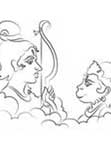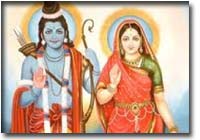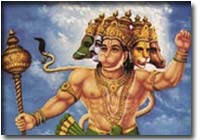YUDDHA KANDAM
 |

Indrajit the conqueror of Indra, appeared before his father and cheered him up, "Grieve not, why should you be worried? I shall make up for all the reverses." He mobilized a mighty army and moved on to the war front striking terror in the enemy forces. He went equipped with all the mystic methods of warfare known to him. To ignite a sacrificial fire and perform mysterious rituals were the first thing he did, thereby making himself invisible and invincible. Then he waged the war, terrible it was to behold. All the warriors in Rama's camp fought valiantly. But all of them fell defeated one after another, for they had to charge against the void or an imaginary enemy. Indrajit was nowhere visible while discharging his deadly weapons. On Rama and Lakshmana he let loose the brahma astra, the inescapable dealer of death. Rama told his brother about the effect of his weapon and also about their willing and seeming submission to it for some time out of regard for Brahma, its originator. Indrajit fought splendidly. Not a single monkey stood erect. All lay prostrate, killed, maimed or made unconscious. Rama and Lakshmana were done to death, so thought Indrajit. He returned triumphant and reported his achievements to his father. Hanuman was the only individual who escaped uninjured. Vibheeshana searched for him and found him out. Both of them walked through the carnage and studied the situation. All the warriors including Sugreeva and Angada lay prostrate. Jambhavan gathered up his exhausted energy and called out in subdued voice if it was Anjenaya that was surveying the situation. Getting a positive answer the old and mutilated bear added, "Hanuman you are the only person who can save us all from this plight. Fly quick to Mount Kailash in the Trans Himalayas. Adjoining it is a peak full of herbs. Four among them are more luminous than the rest. They are Mrutasanjeevanee the herb that gives life to dead, Visalyakaranee the herb that heals wounds, Saavarnyakaranee reviver of them only who belong to the same group or party and not the aliens and Sandhaanakarnee the herb that unites and heals the severed limbs. Pease procure those herbs and fly back as quickly as possible. On you depends the fate of us all."

Mounted on a chariot Indrajit faced Lakshmana in an open warfare. Lakshmana in his turn mounted himself on the shoulders of Hanuman. The fight began and dreadful was the duel. They fought furiously for a long time. Neither party waned. But Indrajit's chariot was smashed. The second chariot that he mounted met with the same fate. The mystic weapon employed by the one was counteracted by the other. They vied with each other in the knowledge of secret weapons and in the skill of putting them to use. At last Lakshmana took up the Indra astra and discharged it uttering, "Let Rama's righteousness and truthfulness have their effect on Indrajit, the son of Ravana." Off went the head of Indrajit, the conqueror of Gods, the protector of the mighty Ravana! As his body rolled on the ground headless, signs of auspiciousness became evident on earth. The monkey and bear forces shouted for joy. Hearing that Indrajit was slain by Lakshmana, Ravana was stunned. He who caused pang to countless souls was compelled to taste it himself to the point of heart break. He took some time to recover form that woeful shock. He then made the grim determination to chop off the head of Vaidehi in revenge. Sword in hand he hurried to Ashoka garden, But Supaarswa a sensible minister made bold to remind the rakshasa villain that by slaughtering a defenseless captive woman he would gain ignominy. Instead he was to kill Rama and make Sita his own. So Ravana desisted and recoiled with dejection.
The bereaved Ravana next ordered his reserve forces to make an all out attack on Rama. If they failed to kill him the king would himself destroy that forest dweller. The gallant army sallied out against Rama. What ensued was a marvel. Rama employed the gandharva astra known only to himself and to Siva. Because of that weapon his presence was felt everywhere and at the same time he was invisible. The rakshasa was all annihilated. The bereft women and children were all weeping and wailing within the city of Lanka. They wailed that the old prediction that a woman would be the cause of the destruction of the rakshasas of Lanka had come true in the person of Sita. Hearing the heart rendering cries of the rakshasas, Ravana grew infuriated. He sailed forth to avenge the slaughter of his people. Fire was sparkling out of his eyes, as it were. But nature outside struck an inauspicious note. The sun seemed pale, quarters hazy and creatures depressed. But the war infatuated Ravana, heading towards annihilation, paid no heeds to portents and pushed against the monkey forces slaying them in large numbers. Equally ferocious was Sugreeva's onslaught on the rakshasas . The death blow that he dealt on Viroopaaksha the demon general was terrifying to the foe. The fallen one was replaced by Mahodara another ogre chief. After a gallant fight he also fell victim to Sugreeva. Angada in his turn gave a valiant fight with Mahaapaarsva, another Rakshasa general and killed him.

